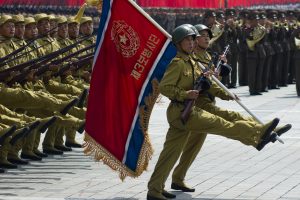North Korea (also known as the Democratic People’s Republic of Korea, or DPRK) claims to have conducted a successful thermonuclear test on Wednesday morning. While experts are already contesting the claim that a thermonuclear device was detonated, it does appear that North Korea tested a nuclear device of some kind, with a yield similar to the previous test in February 2013. Now the question is how the international community will respond – and that response will largely be dictated by the way China, North Korea’s traditional partner and a veto-wielding permanent member of the UN Security Council, chooses to react.
The official position from China’s Foreign Ministry was crystal clear – China “firmly opposes” the nuclear test, spokesperson Hua Chunying said in a routing press conference. “China is steadfast in its position that the Korean Peninsula should be denuclearized and nuclear proliferation should be prevented to maintain peace and stability in Northeast Asia… We strongly urge the DPRK to honor its commitment to denuclearization, and to cease any action that may deteriorate the situation,” Hua continued.
Hua also emphasized that China had not known about the test in advance. She said “experts” were conducting analysis to verify whether or not the device was a hydrogen bomb, as North Korea claimed.
Hua hinted at the possible ill effects on China, saying that China’s Environmental Protection Ministry would be monitoring radiation data along the China-North Korea border to ensure the safety of Chinese citizens. The Punggye-ri nuclear test site, close to where the test was conducted, is in northeastern North Korea, roughly 100 kilometers (62 miles) from the Chinese border.
Foreign Minister Wang Yi also referenced China’s “stern position” on the nuclear test in a speech given at the ministry’s annual New Year reception. He described the test as “in disregard of international opposition” and reiterated that China is “firmly committed to upholding the international nuclear non-proliferation regime.”
North Korea’s last nuclear test, in February 2013, sparked a similarly stern response from Beijing. Yang Jiechi (then serving as foreign minister) summoned North Korea’s ambassador to China for a dressing-down over the test. Reports indicated that China’s government had actively tried to persuade North Korean leader Kim Jong-un not to move forward with the nuclear test, as China was still in the midst of its once-in-a-decade leadership transition (Xi Jinping and Li Keqiang, who had taken up the Chinese Communist Party’s top leadership roles in November 2012, would not be officially named president and premier until the National People’s Congress in March 2013).
In response to the 2013 test, China backed a new round of UN sanctions on North Korea. On March 7, less than a month after the test, the UN Security Council unanimously passed Resolution 2094, expressing “the gravest concern” at the nuclear test and condemning it “in the strongest terms.” The resolution applied sanctions to North Korean financial institutions, laid down travel restrictions on certain North Korean leaders, and limited the import of luxury goods.
The groundwork is laid for a more robust reaction in 2016. In the three years since North Korea’s last nuclear test, China has simultaneously grown closer to South Korea and farther away from North Korea. To cite just one example, Xi and South Korean President Park Geun-hye have held six summit meetings in those three years, while Xi has never met North Korea’s Kim Jong-un.
In fact, the China-North Korea relationship seems to have never quite recovered from the 2013 nuclear test. Ties just seemed to be getting back on track in the fall of 2015, with Choe Ryong-hae’s attendance at China’s military parade in September 2015 and Liu Yunshan’s visit to Pyongyang in October. But then in December, the two countries had another spat over a series of planned musical performances, resulting in two North Korean groups packing up and going home.
Despite tensions, however, Beijing is far from ready to ‘abandon’ North Korea. Ultimately, China still remains committed to seeking a solution to the North Korean nuclear problem through dialogue (either a return to the Six Party Talk or an as-yet unclear alternative grouping), rather than punitive measures. Beijing has gone on the record numerous times against the concept of sanctions in general; though China has proven willing to hold its nose and go along with UN Security Council sanctions in the wake of North Korean nuclear tests, that’s likely to be the limit to China’s cooperation.
And history indicates that if the response to North Korea’s nuclear test is simply more sanctions, it’s unlikely to have any real impact on the regime. In 2013, the United States was pleased with China’s cooperation at the UN; then-U.S. Ambassador to the UN Susan Rice told reporters, “These sanctions will bite and bite hard.” But, as demonstrated by Wednesday’s test, the sanctions haven’t been able to stem the slow but steady development of North Korea’s nuclear program – in part because they aren’t being enforced fully, particularly by China.
Whether this represents a deliberate government effort to secretly back North Korea, or whether Chinese bureaucrats simply aren’t equipped to catch profit-minded companies willing to flaunt the sanctions is unclear. Regardless, experts agree North Korea has had little issue getting access to supposedly banned Western technologies via Chinese companies. As Joel Wit of the U.S.-Korea Institute put it in a presentation on North Korea’s nuclear futures last year, there’s little evidence that sanctions have actually affected Pyongyang’s ability to access nuclear technologies.

































